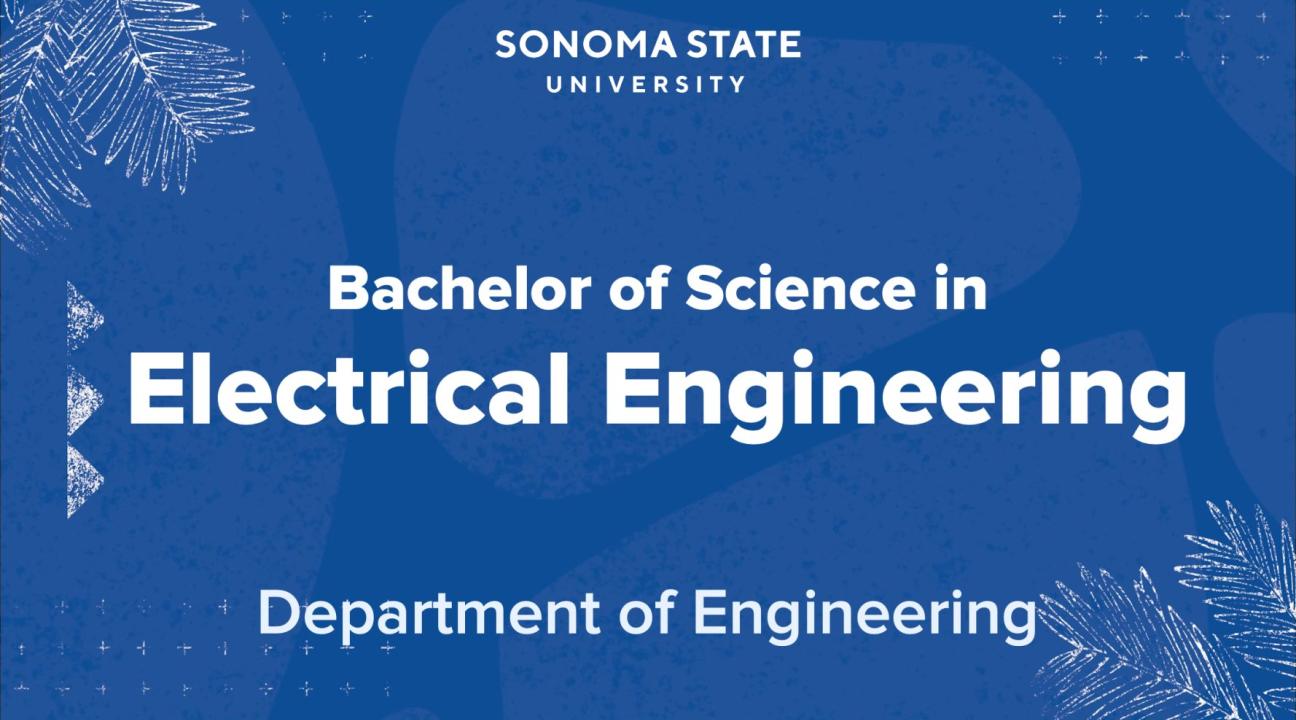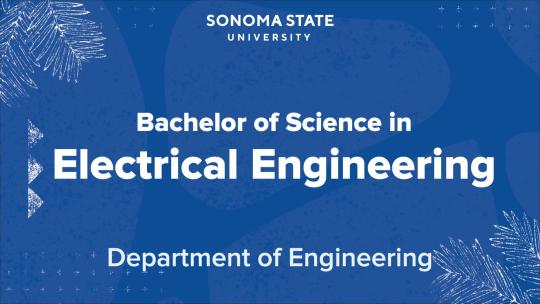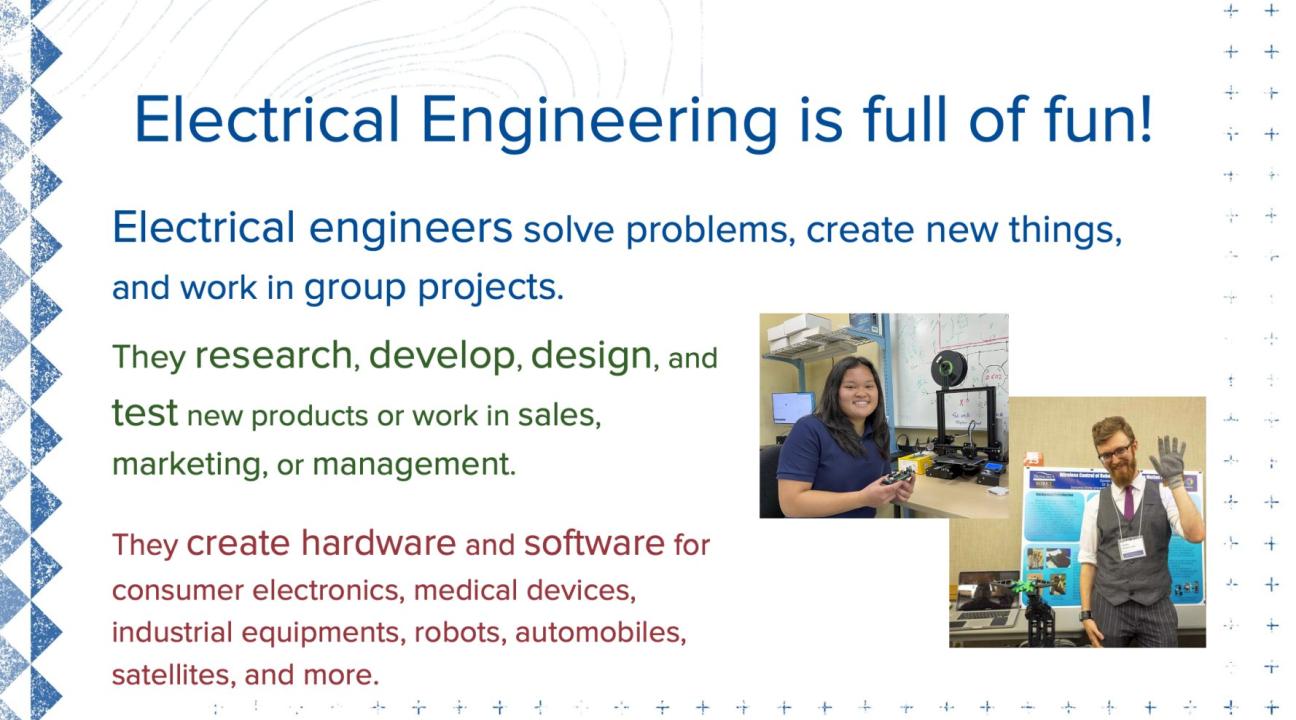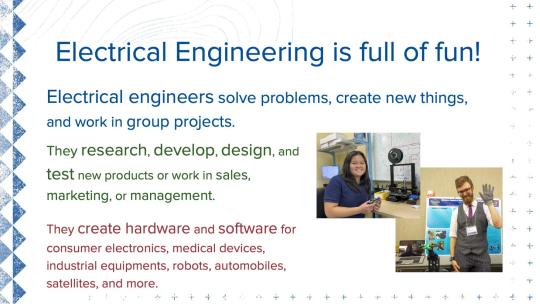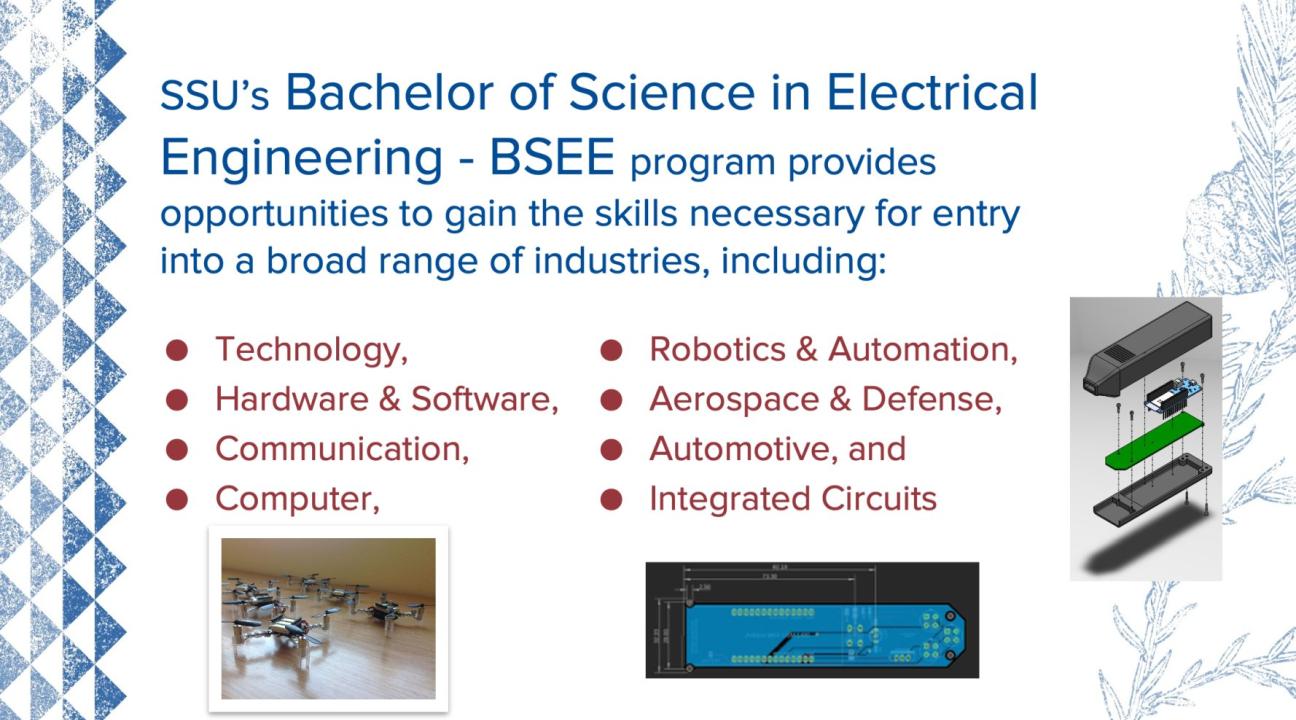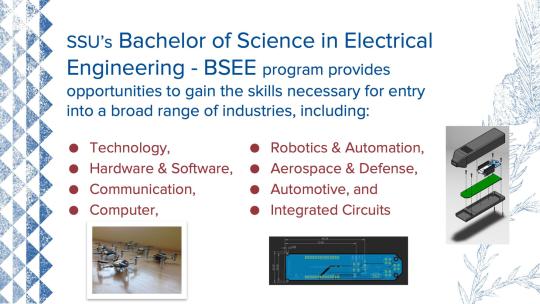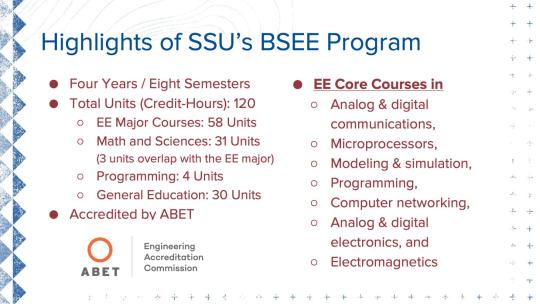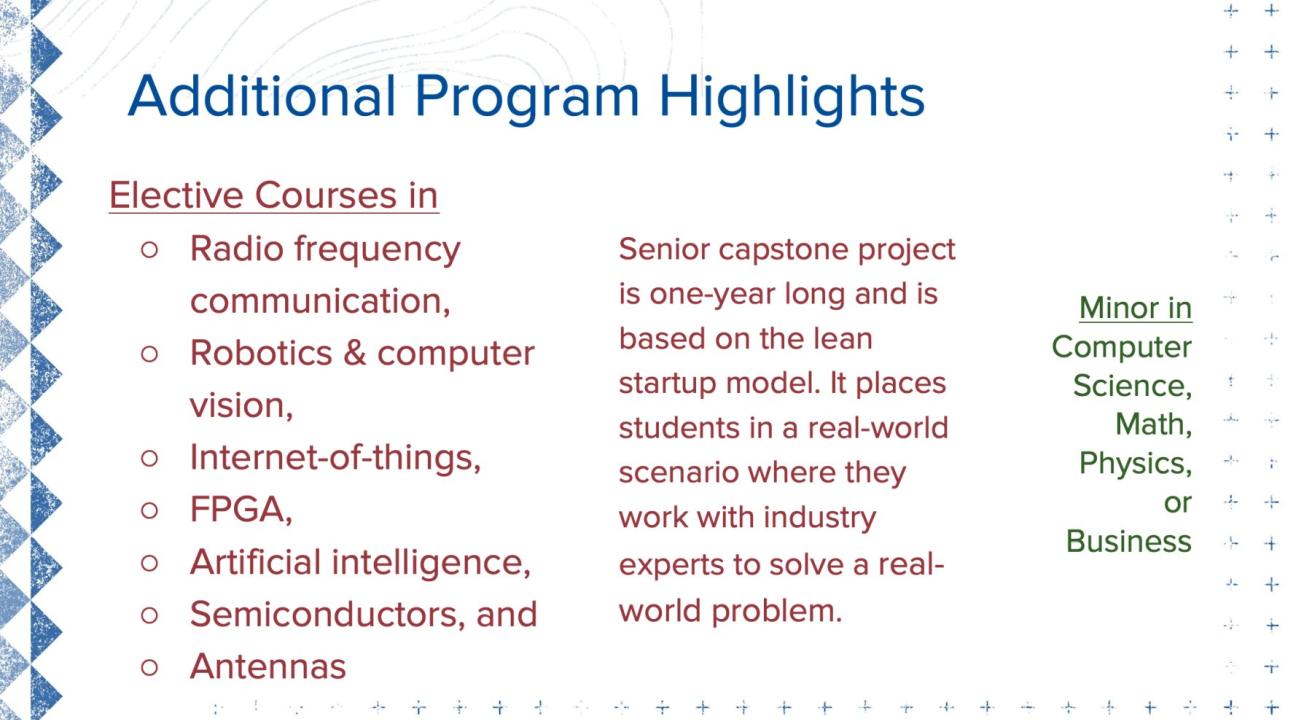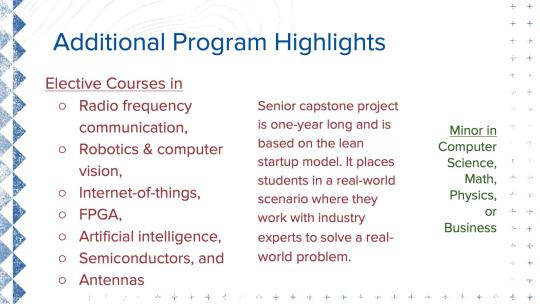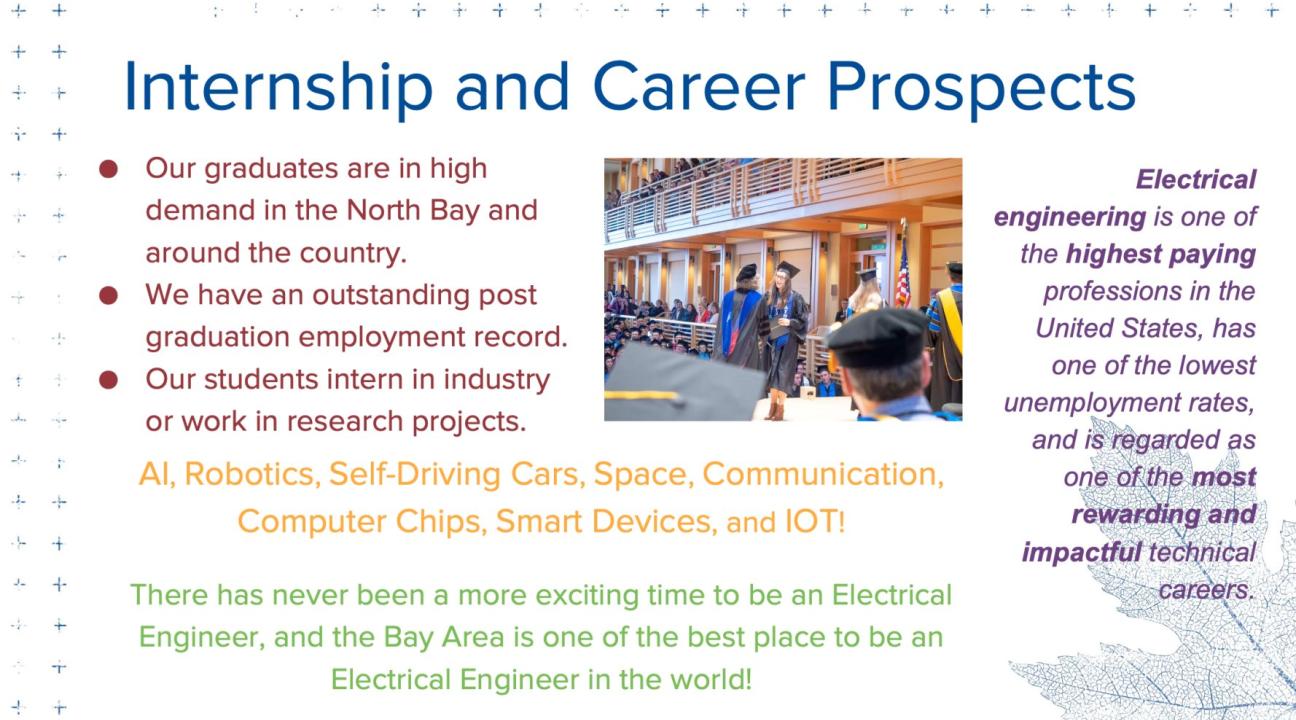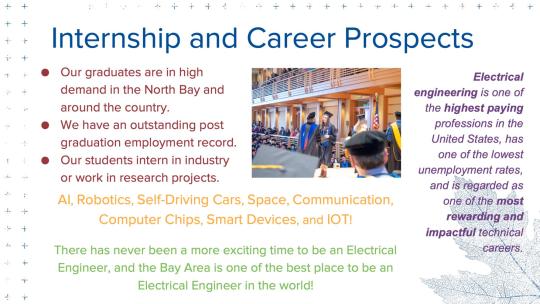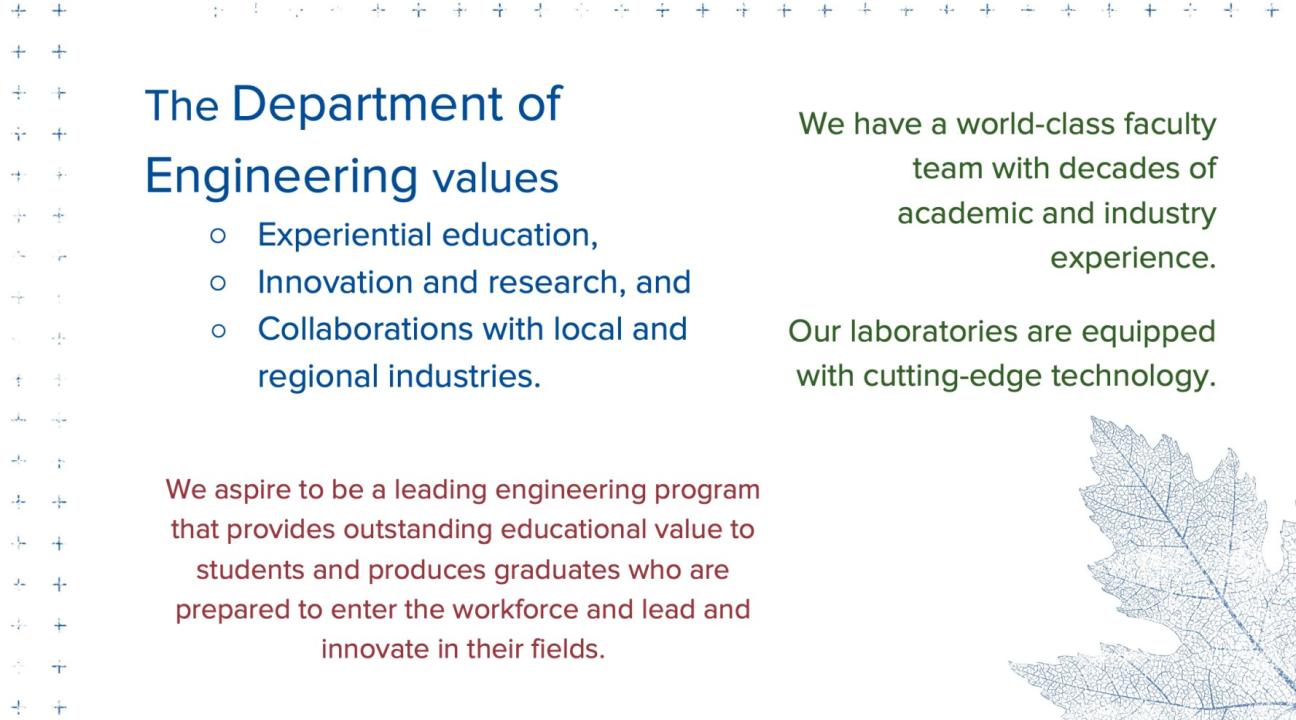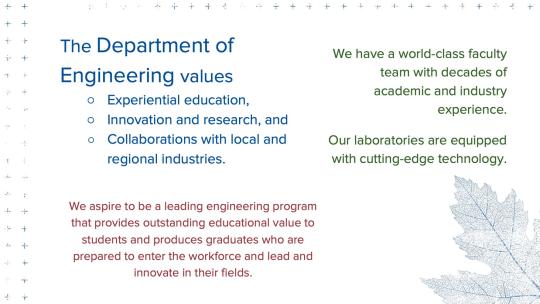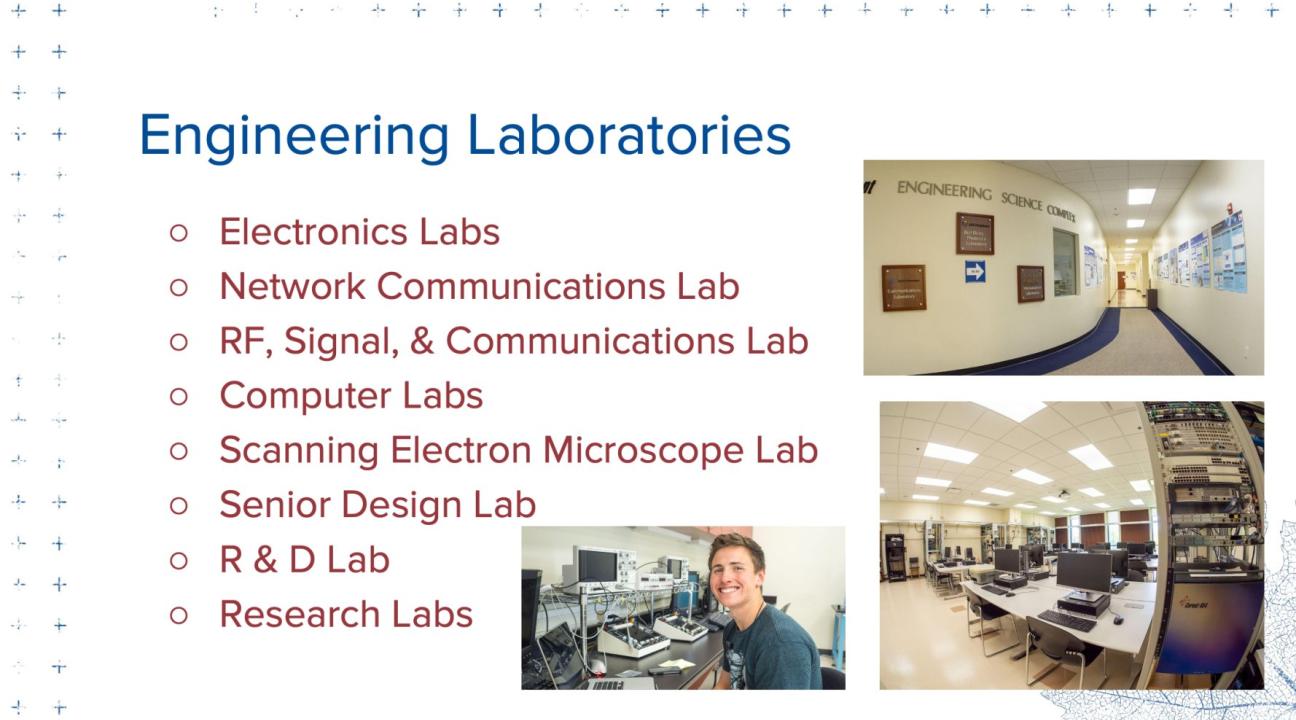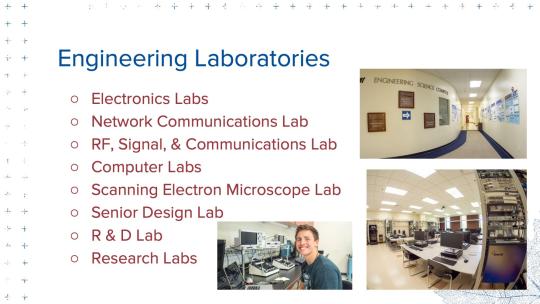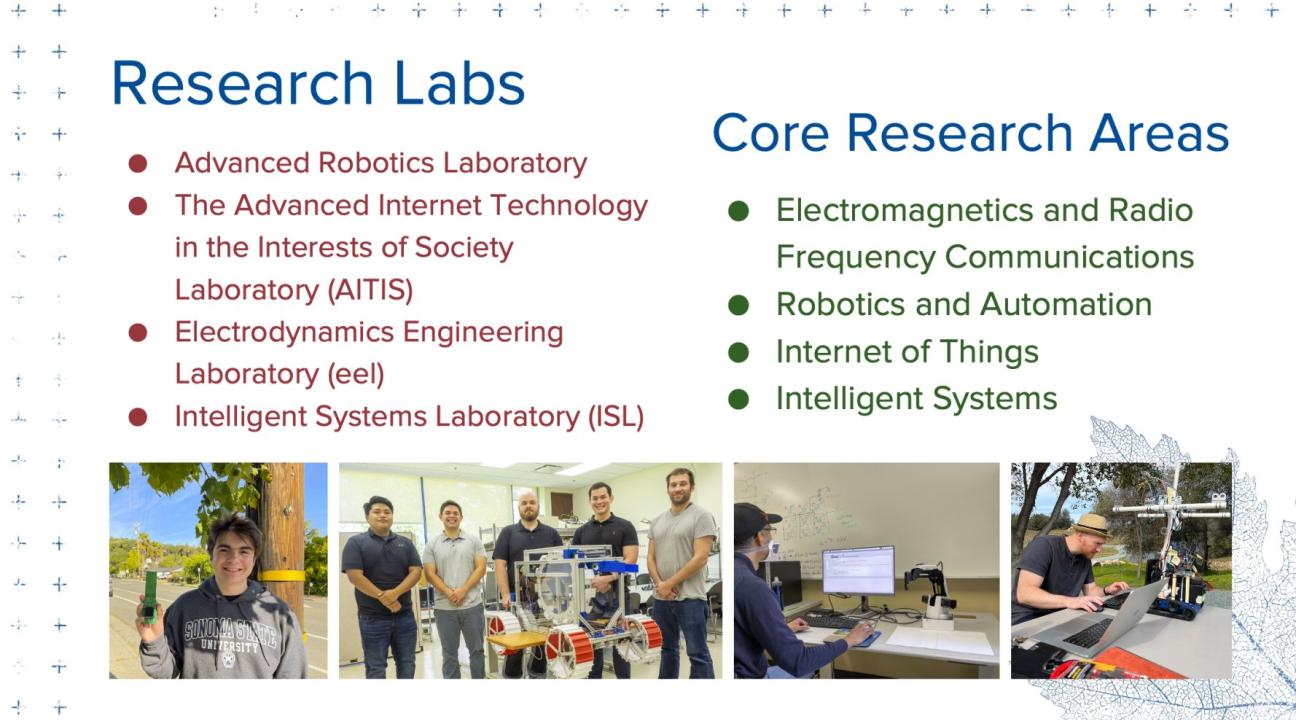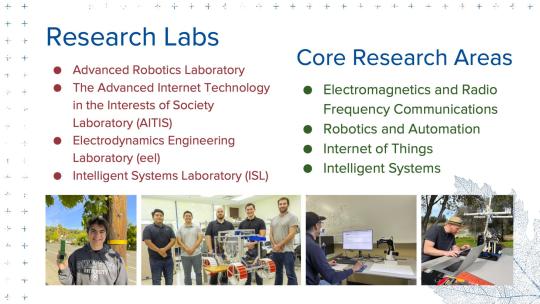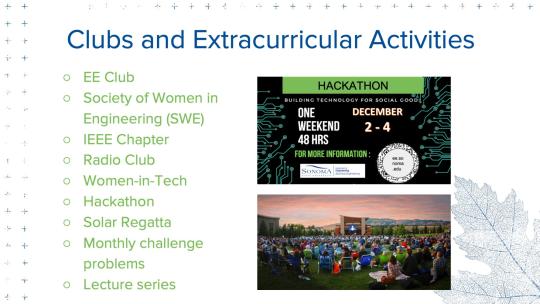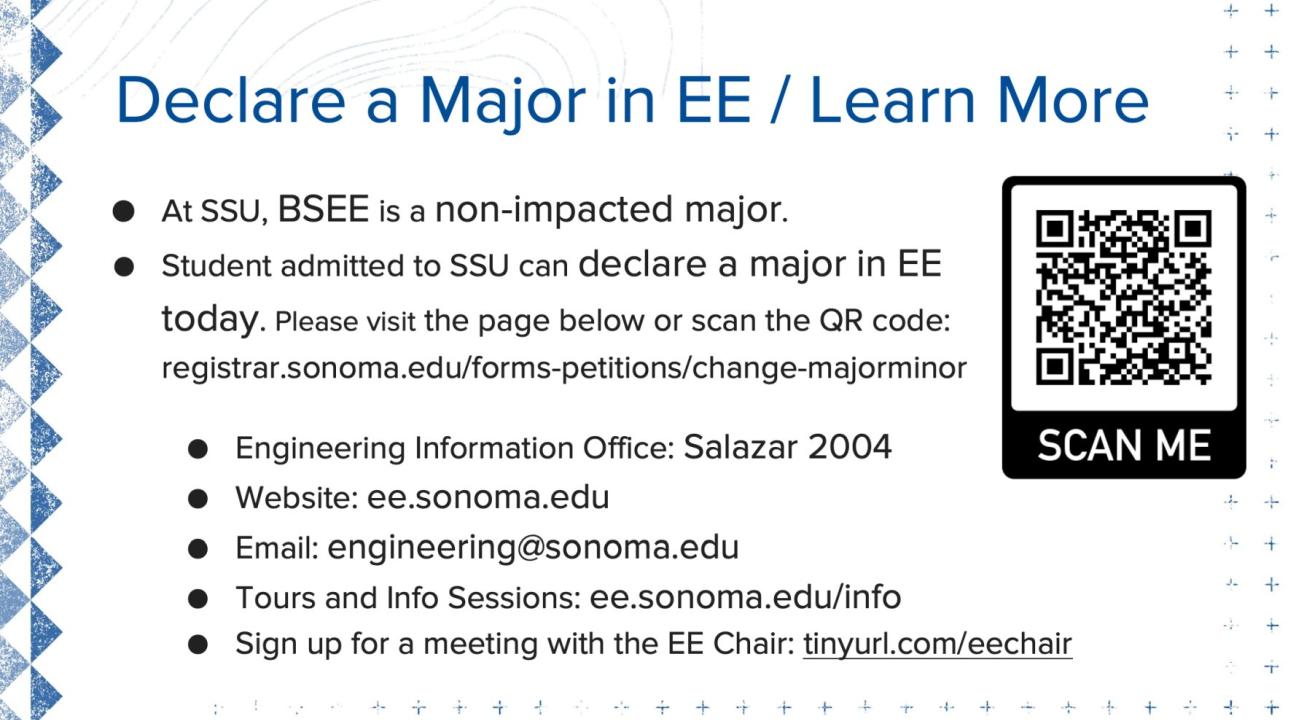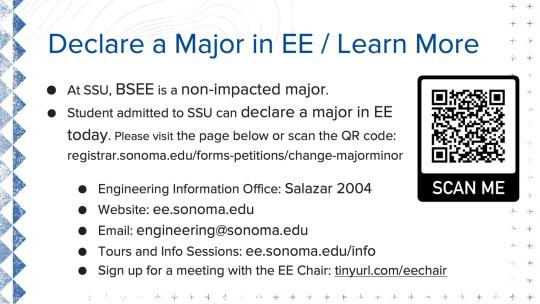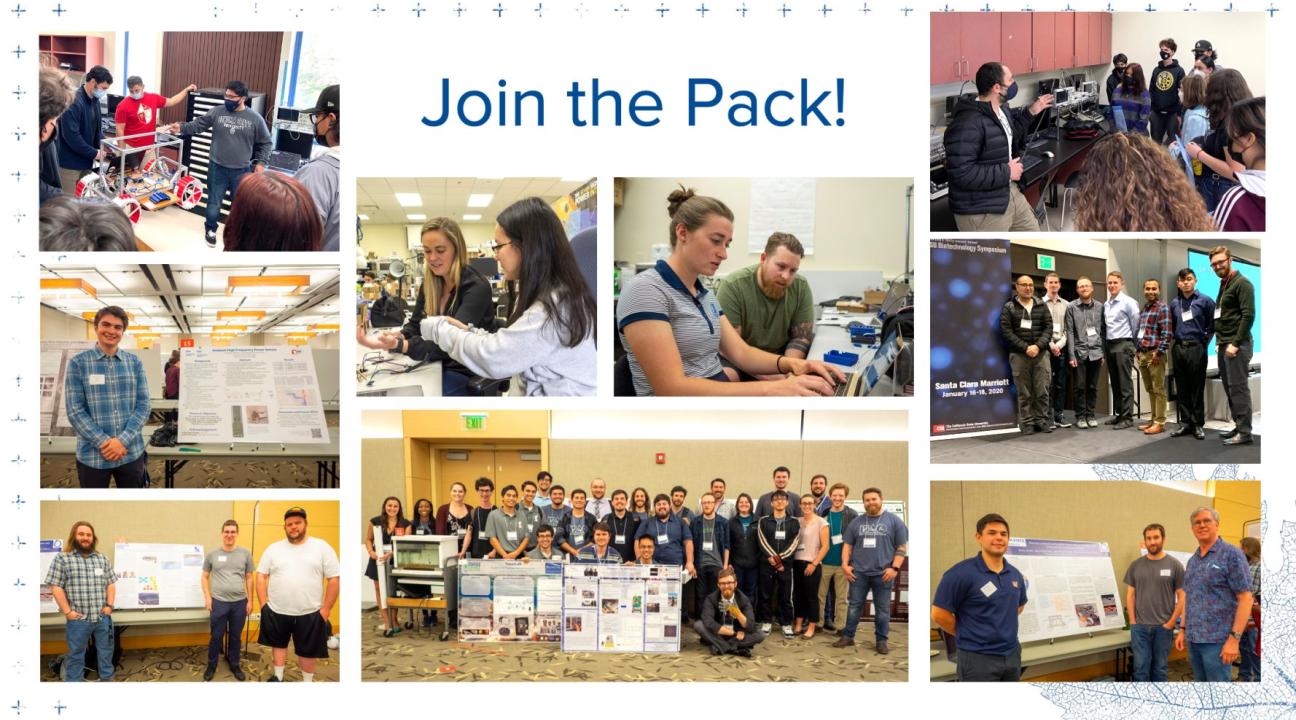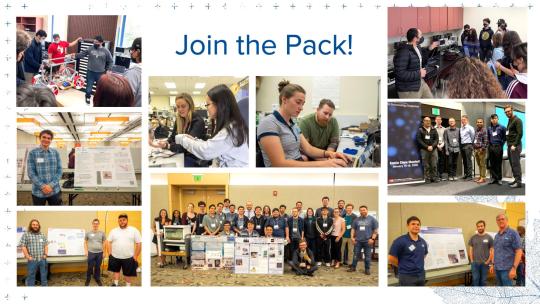Future Students
Why Choose SSU’s Engineering Department?
- Cutting-edge labs and facilities
- Hands-on learning and research opportunities
- Expert faculty members with industry experience
- Strong connections with leading tech companies
- A supportive community that fosters innovation
Program Highlights:
- BS in Electrical Engineering: Develop a strong foundation in electronics, communication systems, hardware, and software, preparing you for a variety of exciting careers in the technology, communication, computer, robotics, and integrated circuits industries. The BSEE program is accredited by the Accreditation Board for Engineering and Technology (ABET).
- MS in Electrical & Computer Engineering: Advance your knowledge with specialized courses in AI, embedded systems, signal processing, and more. Gain research experience in state-of-the-art labs.
Start Your Journey Today!
- How to Apply: Visit Apply to Sonoma State University
- Sonoma State Application Deadlines
- Transfer Students
- Questions:
The Engineering Department
The Engineering Department at Sonoma State University strives to deliver a world-class education in engineering through hands-on experiential and exploration learning in state-of-the-art classrooms and labs, led by an experienced faculty team. We offer a Bachelor of Science in Electrical Engineering (BSEE) and a Master of Science in Electrical and Computer Engineering (MSECE).
At SSU, BSEE and MSECE are non-impacted majors.
The BSEE Program
The mission of the BSEE Program is to prepare you to be a learned person who is capable of pursuing a fulfilling career in a changing world. A broader mission is to help you to acquire knowledge and experience that prepare you to pursue lifelong learning, advanced study, and leadership roles in business and the community. Our BSEE program is accredited by ABET. ABET is the global accreditor of college and university programs in applied and natural science, computing, engineering, and engineering technology.
BSEE Degree Highlights
- The BSEE curriculum consists of 90 units of major courses in electrical engineering, programming, mathematics, physics, and life-sciences and 30 units of general education courses.
- The program includes courses in electrical, computer, electronics, and communications engineering, as well as electives in emerging subjects such as radio frequency (RF), robotics and computer vision, internet-of-things, field programmable gate array (FPGA), artificial intelligence, semiconductors, antennas, and a capstone project.
- Upper-level electives allow students to delve more deeply into their areas of interest and the capstone project gives them the opportunity to consolidate their educational experiences.
- The curriculum develops students' ability to formulate problems, analyze alternatives, make decisions, and solve problems.
- Internships and research are encouraged to provide students with real-world experience and enhance their communication and interpersonal skills.
- The general education curriculum includes courses in communication, critical thinking, scientific inquiry, quantitative reasoning, arts, humanities, social sciences, life-long learning, self-development, and ethnic studies.
For transfer information and transfer-specific sample plans, please visit the Transfer Students web page.
Note: This information is based on the 2023-2024 Catalog.
Career Paths and Opportunities
The BSEE program prepares students for exciting careers in industry and for graduate school. The graduates will find opportunities in industries such as:
- Technology;
- Hardware and Software;
- Communication;
- Computer;
- Robotics and Automation;
- Aerospace and Defense;
- Automotive; and
- Integrated Circuits.
An electrical engineer's job duties can include research and development, designing, testing, sales, marketing, and management. Some examples of job titles are: electrical engineer, hardware engineer, software engineer, computer engineer, design engineer, test engineer, validation engineer, application engineer, field engineer, system engineer, network engineer, project engineer, system analyst, network analyst, project analyst, and project manager.
Graduate degrees could be pursued in any one of the many fields such as electronics, communications, networking, computer engineering and computer science.
Job Placement Record
We have an excellent job placement track record. Our graduates are in high demand in the North Bay and around the country. According to our 2020 evaluation, 85 percent of our BSEE graduates found work in engineering-related professions within six months of graduation. As of March 1, 2022, more than half of the seniors graduating in May 2022 have job offers or are employed in their field of study.
Minoring Opportunities in CS, Math, and Business
As an EE major, you will have the flexibility to pursue minors in Computer Science (CS), Math, and Business Administration. You can earn a minor in CS with four additional CS courses (11-13 units), a minor in Math with one additional Math course, a double major in Math with 11 additional units of Math courses, and a minor in Business Administration with five business courses (20 units).
You can also earn minors in Economics and German. For further details, please visit the Minor in Other Disciplines web page.
The MSECE Program
The Master of Science in Electrical and Computer Engineering (MSECE) is for students who already have a four-year bachelor’s degree in electrical, electronics, computer, software, or a closely related field. The MSECE program focuses on the interconnection between electrical engineering hardware and computer science software. The 32-unit curriculum blends relevant academic coursework with practical engineering experience, thereby addressing the evolving demands upon engineering in our progressively technology-driven world. The MSECE program includes internships and opportunities for collaboration with local industries that prepare graduates for employment in high-tech industries. The normal length of the study is two years. For additional information on the program, requirements, and application process, please visit the M.S. in Electrical & Computer Engineering web page.
Research, Assistantships, and Scholarships
Research, creative work, scholarship, and leadership development are at the core of our experiential and exploration learning model. You will have opportunities to work in research projects sponsored by engineering research laboratories, SSU centers and laboratories, and external funding sources. Research and teaching assistantships are offered through the department, school of science and technology, and various SSU programs. Numerous scholarships are offered every year through various Sonoma State Programs. Below are example assistantships and scholarships available every year.
- Research Assistantships are offered through: the Research Laboratories and various university centers, including the Center for Environmental Inquiry.
- Teaching/ Tutorial Assistantships are offered through: the Engineering Department, the Learning and Academic Resource Center (LARC), and the Mathematics, Engineering, Science, Achievement (MESA) program.
- SSU Scholarships: SSU awards more than $2.5M in financial aid and scholarships each year.
Extracurricular Activities
As an EE major, you will have plenty of opportunities to participate in extracurricular activities, from the very first semester at SSU, even as a freshman. You will have opportunities to join and even lead student organizations, including EE Club, Society of Women in Engineering (SWE), IEEE Student Chapter, and Radio Club. Through these bodies, you can organize events, participate in project competitions, start a project of your interest, create study groups, play sports or video games, network and make friends, or just hang out for lunch. SSU is an NCAA Division II member and part of the California Collegiate Athletic Association (CCAA). SSU has 11 sponsored sports in the CCAA. Follow SSU Seawolves.
Training, Skill Building, and Networking Opportunities
In the Engineering department, you will have the opportunity to get training or learn skills beyond regular classes. We organize department- and industry-sponsored training, Skill Building Workshops, Lectures & Workshops, hackathons, competitions, and field-trips throughout the year. Well-known tech and other companies come to our department for information sessions, meetings, resume workshops, and other events. You will have the opportunity to participate in these events and expand your network for future job offers.
Faculty, Staff, and Industry Advisory Board
We have a world-class faculty team with advanced degrees and decades of experience who are eager to work with you and help you succeed. Our faculty are excellent teachers and researchers who continually develop an innovative curriculum that meets the needs of the changing world. They lead cutting-edge research and development projects. We have a caring staff team willing to support you at every step of the way. We have an industry advisory board of diverse local industry leaders to help us guide our department and the degree programs. Please visit our Engineering Faculty & Staff and Electrical Engineering Industry Advisory Board (EIAB) websites for more information.
Laboratories and Facilities
The SSU Engineering department has advanced state-of-the-art laboratories and research facilities. As an EE major, starting from the freshman year, you will work with advanced equipment like oscilloscopes, signal generators, power supplies, and precision multimeters. As you progress through the program, you will work with more advanced equipment and tools, that include network routers, spectrum and vector network analyzers, microcontrollers, circuit simulators, and advanced design and simulation softwares. You will also have the opportunity to work with robotic arms, unmanned aerial vehicles (UAVs), antennas, radars, field programmable gate arrays (FPGAs), printed circuit board (PCB) design, network servers, 3D design and printing, scanning electron microscope (SEM), various machine tools, and virtual reality (VR) sets.
Our facilities include state-of-the-art teaching and research spaces such as electronic labs, a networking lab, an RF and communications lab, a computer simulation lab, an electrodynamic engineering lab (eeL), an advanced internet technology in the interests of society lab (AITIS Lab), an intelligent systems lab (ISL), an advanced imaging lab, and a makerspace. SSU continually upgrades it’s classrooms to create a student-centered collaborative learning environment. For more information, please visit Cerent Engineering Complex and Equipment and Instruments in Laboratories webpages.
Advising, Tutoring, and Other Supports
We have robust advising, tutoring, and support infrastructures for our students. As an EE major, you will be assigned an advisor whom you can seek advising help at any time in the semester. You will meet at least once every semester with an advisor to help you choose courses and to ensure that you are on your graduation track. When needed, you will be able to get help from EE, math, physics, and writing tutors. We have a technical support system when you need a computer or other technical help.
Information Sessions, Tours, and Application Assistance
Please feel free to email or call to schedule an appointment with us. Email Engineering Department, Phone: (707) 664-2030
Department and Campus Tours
Engineering Department tours are available on the BSEE information session days or by appointment. Start your SSU Campus Tours here.
Find Your Sonoma Home and Live On Campus
Experience what life is like at Sonoma State by living in the heart of campus and in the #1 University housing in the CSU system. Our living spaces are spacious and welcoming, and suite and apartment-style options are organized around academic, social, and lifestyle interests, allowing you to more easily connect with students who share your passions. Our housing is anything but traditional and much of our housing includes a living room, kitchen, and private bathrooms.
Choose from six unique residential villages that foster friendships and cultivate community, enhancing and enriching your academic journey. When you live on campus, you join an instant community and have everything you need to succeed right outside your door. To learn more, visit the Housing website.
Financial Aid
For financial aid information, please visit the Financial Aid Office website.



